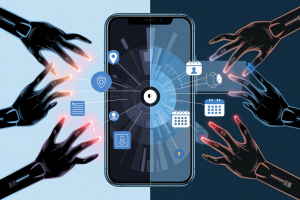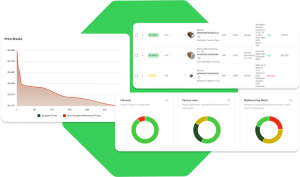Tim Cook Says No To iPad-Mac Hybrid
![]() Today’s mobile news roundup features Apple’s stellar financial report, Ericsson’s strong Q1, an ITC ruling win for Motorola Mobility and more.
Today’s mobile news roundup features Apple’s stellar financial report, Ericsson’s strong Q1, an ITC ruling win for Motorola Mobility and more.
Apple rocks Q2 as Cook hints on settling patent disputes and no to hybrid
Apple reported stellar financial report for Q2 2012, reporting a net profit of $6 billion. Combined revenue for iPad and iPhone sales is at $29.2 billion, marking the majority of their total $39.2 billion revenue.
Apple sold 11.8 million iPads this quarter, a 151% increase compared to the same quarter last year.
“The new iPad is on fire. We are selling them as fast as we can make them,” Apple Senior Vice President and Chief Financial Officer Peter Oppenheimer said in an earnings call on Tuesday.
After the earnings call, Apple CEO Tim Cook answered some questions regarding whether they’re planning on joining the band of tablet-laptop hybrid makers and addressing patent lawsuits.
Cook stated that they will not be making an iPad-Mac hybrid, as he believes this would compromise both devices. They always want users to experience the best of their products. He also stated that joining two products doesn’t necessarily make it the best product, or a product that consumers would want to buy or use.
“Anything can be forced to converge,” Cook stated. “But the problem is that products are about trade-offs, and you begin to make trade-offs to the point where what you have left at the end of the day doesn’t please anyone. You can converge a toaster and a refrigerator, but those things are probably not going to be pleasing to the user. We’re not going to that party… others might from a defensive point of view.”
As for the patent lawsuits, he would be appearing with Samsung CEO Gee-Sung Choi in the court ordered conference in the hopes of settling their patent dispute, instead of pushing for a full-on trial. It looks like there might be hope for a settlement as Cook stated he hates litigations and would opt for settlements if possible.
“I’ve always hated litigation, and I continue to hate it,” Cook said. “We just want people to invent their own stuff. If we could get into some kind of arrangement where we could be assured that’s the case and a fair settlement of the stuff that’s occurred, I would highly prefer to settle versus battle.”
Ericsson reports strong Q1
Ericsson, the biggest maker of mobile network equipment, reported a profit increase of 8.8 billion kronor, or $1.3 billion, from 4.1 billion kronor last year. The increase in earnings is attributed to the 7.7 billion kronor they earned when they sold 50% of their stake in Sony Ericsson to Sony.
But the company also suffered some setbacks as sales fell 4% to 51 billion kronor from 53 billion kronor last year, as demand for network equipment using code division multiple access, or CDMA, declined. Sales of network equipment, which made up 54% of Ericsson’s total sales, fell by 18% to 27.3 billion kronor from 33.2 billion kronor a year earlier. But sales of outsourcing and network management services and software solutions, which made up 46% of sales, rose by 20%, to 23.6 billion kronor from 19.7 billion kronor.
Motorola wins ITC ruling in case against Microsoft
Motorola Mobility Holdings Inc. won a U.S. International Trade Commission judge’s ruling that bolsters its chances of blocking imports of Microsoft’s Xbox gaming system from entering the U.S.
ITC Judge David Shaw stated that Microsoft violated four of five Motorola patents. This ruling could lead to MoMo blocking imports of Microsoft’s Xbox to the US. The ruling is still not final as Shaw’s findings are subject to be reviewed by the six-member commission, which has the power to ban imports that infringe U.S. patents.
“Microsoft continues to infringe Motorola Mobility’s patent portfolio, and we remain confident in our position,” said Becki Leonard, a spokeswoman for Motorola Mobility, in an e-mailed statement. “This case was filed in response to Microsoft’s litigate-first patent attack strategy, and we look forward to the full commission’s ruling in August.”
Huawei to make chips
Huawei Technologies, a Chinese handset maker, is looking into making and selling their own mobile chips to keep up with the competitive market.
“In the future, whether it be mobile broadband devices, tablets, or smartphones, Huawei will be able to provide its own core chip solution,” said Huawei executive vice president Eric Xu. “If we cannot make money from smartphones, we can still make money from the chipset offerings. If we can make money from every smartphone chip, then it will be substantial.”
A message from John Furrier, co-founder of SiliconANGLE:
Your vote of support is important to us and it helps us keep the content FREE.
One click below supports our mission to provide free, deep, and relevant content.
Join our community on YouTube
Join the community that includes more than 15,000 #CubeAlumni experts, including Amazon.com CEO Andy Jassy, Dell Technologies founder and CEO Michael Dell, Intel CEO Pat Gelsinger, and many more luminaries and experts.
THANK YOU









